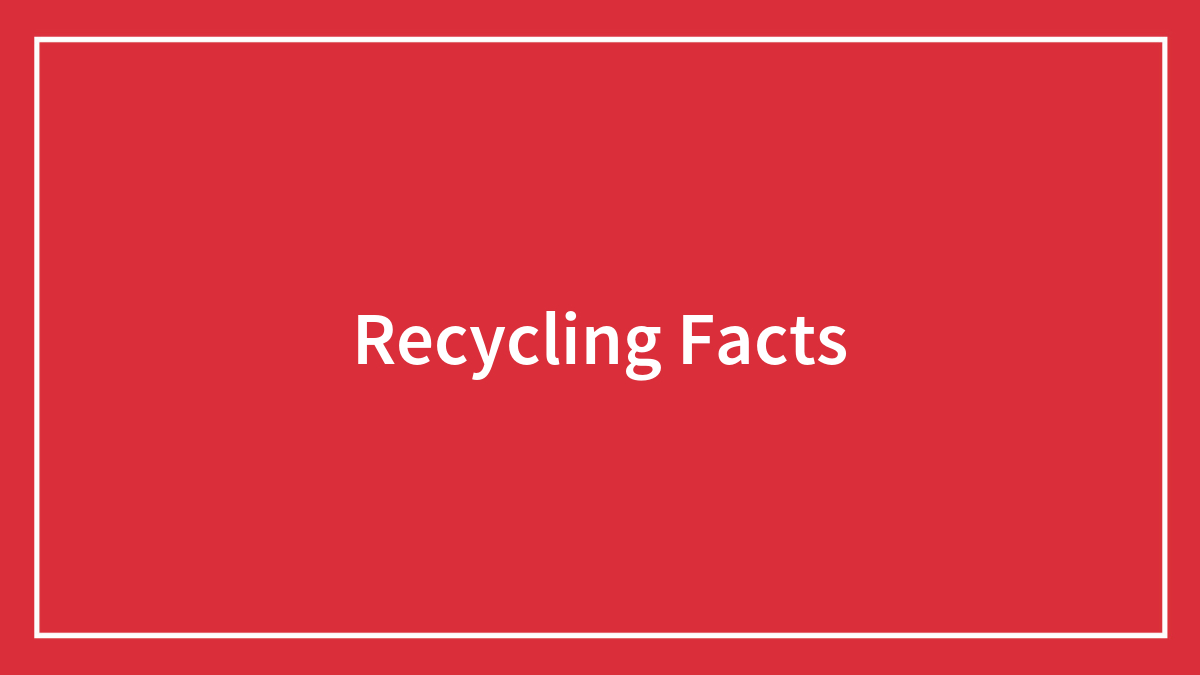This isn’t one of those articles telling you about the very sad outcomes of climate change - we know that you’re conscious of it, and there’s no need to make us all even more worried and sad about what’s to come if we do not act now. Instead, this article dedicated to recycling facts will tell you some truly interesting bits of information that will make you feel good about your efforts and stress the benefits of putting your paper, plastic, and glass in separate containers (however tedious it might sometimes seem). So, ready to check out our selection of facts about recycling?
But, before you do, hang on a minute - we still need to talk a bit about what to expect from this list. We’d like to stress the notion of this being a list of fun facts about recycling and that there’s no need to drink a cup of calming herbal tea before you read them. In fact, we even made sure to include recycling facts for kids in our roster, so you can educate the little ones on the subject, too. And lastly, these interesting facts about recycling come with cool comparisons, so it is easier to visualize the real impact of your good habit or how it will look when we all finally start separating our trash to be sent to recycling facilities. Disclaimer - it will be a deed of epic proportions!
Okay, it seems that this introduction has done its job, so let’s skip straight to our cool facts about recycling, shall we? By now, you probably know where to find them - that’s right, just a smidgen down below! Once you check them out, give the most interesting facts you vote for so they find their way to the top of this list. And lastly, share this article with your environmentally conscious friends!
This post may include affiliate links.
Glass can be recycled endlessly without losing its quality or purity and is entirely recyclable.
I learned, that you should not put glas that is not a bottle in the recycling bin because it has other properties. So: it depends
Since 2016, Germany has had the highest recycling rate in the world, with 56.1% of all waste it produced last year being recycled.
Only 9% of all plastic waste ever produced has been recycled.
Wasted plastic that is produced every year could circle the globe four times.
One of the most frequent sources of water pollution is used cooking oil.
Again, if we want change, make it easy. In most places if you want to be responsible and not mix your used oil with water, you have to collect it, store it until you have enough to justify a trip, then somehow figure our where in your vicinity you can get rid of it, take it to that site and ask them to take it. Compared to that, you can just easily dump it into the sink or toilet, and it's out of sight, out of mind. Which one will most people choose? But if you could just pour it back into the original packaging after it's used up and let's say leave it next to bin on collection day, and it was collected separately and then safely dealt with, I bet more people would do it. As long as it's a hassle, most people will not bother and they'll justify it by "it's just a small amount, others do much more harm!"
Between 30-40% of all food produced in the U.S. is wasted.
It's worth mentioning that the majority of that is not wasted in the households (they could surely do much better too of course), but at the points of sale, e.g. in shops. Tons of food, especially fresh produce goes into the bin when it's not "perfect" anymore. Obnoxious sell by dates are also to be blamed. Once food is past that, shops can't legally sell it, even if it's obvious that it's still edible. So they dump it.
Plastic bags might take up to a 1000 years to decompose.
But you know what? You can use them for decades if you take a tiny bit care of them. I have plastic bags that I have used soooooo many times the last 30-ish years. I have never ever tossed a plastic bag that was still good to use. And I try to not use them for sticky/messy stuff unless I really have to. Also, the last thing a plastic bag is used for in my household is as trash bag for plastics we sort from the trash.
Recycling just one ton of plastic bottles equals enough energy for a two-person family for an entire year.
In the United States, electronic trash makes up around 2% of the waste stream.
40 hectares of rainforest are cleared every minute for agricultural and industrial development.
One sheet of A4 paper requires approximately 10 litres of water to produce.
More than 90% of all goods shipped from the United States are packaged in corrugated boxes which is more than 400 billion square of cardboard.
About 95% of discarded food ends up in landfills.
Tires, pens, razor blades, diapers, and aluminum are the most often thrown-away items in America, all of these materials can be recycled to make new products.
In the UK, just 27% of batteries are recycled, which results in almost 20,000 tonnes of battery trash going straight to the dump.
I had personal experience with this as I used to work in a place that was required to accept used batteries for recycling. While it was mandatory for us to collect the batteries, nobody EVER checked our paperwork, or if we properly forwarded the batteries to a site where they actually would've been recycled. Most people did not know that they could just bring their used batteries of almost any kind into a shop like ours so often they just tossed them because they didn't know what to do with them. The service that was supposed to collect our collected batteries often did not turn up to pick them up. We heard rumors that they just dumped them anyways. Where I'm going with all this is that while I do firmly believe in personal responsibility, I also think that if we as a people want to see change, the people in charge need to make things like this easy and accessible to all, need to educate about it, and need to actually monitor the outcome.
85% of textiles end up in landfills or are incinerated although most of these materials could be reused.
"That's terrible. Anyway, have you seen the 15th collection at H&M this year?"
Recycling one aluminum can results in energy savings sufficient to power a TV for three hours.
Nearly 40 million tons of food are wasted in the United States each year, more than any other nation.
Recycling one glass bottle can save enough energy to run a 100-watt lightbulb for four hours.
In as little as 60 days, an aluminum can is recycled and put back on the grocery store shelf as a brand-new can.
Each year, Americans discard 25 billion coffee cups made of Styrofoam.
In the United States, landfills receive around 11.3 million tons of textile waste annually or about 70 pounds per person.
Some 54 million metric tonnes of phones, computers, and other so-called e-waste are produced a year. Only 17 percent of e-waste is recycled.
Over 70% of all garbage in offices is made up of paper.
It's a hidden benefit of working from home - no one prints as much anymore on their home devices.
For every ton of recycled paper produced, 17 mature trees can be preserved.
Recyclable aluminum may be produced with only 5% of the energy required to create a product from new materials.
EPA estimates that 75% of American trash is recyclable, yet we barely recycle about 30% of it.
The question I always heard is “Who pays for the recycling process?” I think a lot of people are afraid to demand better recycling programs in their cities due to that cost getting passed onto the taxpayer.
40 percent of the devices sent to U.S. recyclers were exported offshore, with the vast majority ending up in Asia.
Many regions of Asia and Africa as well as some other countries throughout the world have partial bans on plastic bags.
One ton of plastic can be recycled, saving 1,000–2,000 gallons of gasoline.
When combined, recycling and composting can reduce energy consumption by three to four times compared to burning waste.
Styrofoam never decomposes.
It only breaks into smaller and smaller micro plastics which are eaten by plankton and work up the food chain until we eventually are ingesting it
Modern glass bottles would take at least 4,000 years to break down, and even longer if they were disposed of in a landfill.
Every year, landfills receive more than 28 billion glass bottles and jars. Two Empire State Buildings could be filled with that every three weeks.
In America, 85 million tons of paper are consumed annually, or around 680 pounds per person.
One tree is saved when three feet of newspaper are recycled.
Trash recycling typically costs $30 per ton, landfill disposal costs $50, and incineration costs between $65 and $75 per ton.
In the US a person produces 4.4 pounds of trash per day, with roughly 1.51 pounds recycled per person per day.
This really needed links to the sources. Not to mention calculations as to how they got to some of these equations
We need to think about our actions and actually do something about it. I predict in about 10 years our planet will be so polluted we cant live on it.
This really needed links to the sources. Not to mention calculations as to how they got to some of these equations
We need to think about our actions and actually do something about it. I predict in about 10 years our planet will be so polluted we cant live on it.

 Dark Mode
Dark Mode 

 No fees, cancel anytime
No fees, cancel anytime 










































































